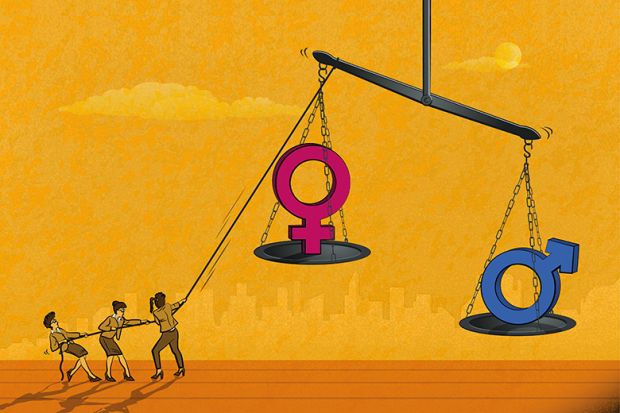To say or write the word misogyny is an escalating manoeuvre. It elicits a reaction – and one that is often dismissive of the need to use that word in the first place. In academia, we are far more comfortable with using “gender” or “sexual” to label the bias, behaviours and forms of violence that do harm to women. Yet these do not get to the heart of the matter.
In the UK, the Athena Swan gender equality scheme is a useful tool and has achieved a great deal. But research reveals that it has not led to systemic change – in part because when we make only one or a few people responsible for equality, diversity, and inclusion, this excuses others in the institution from being responsible for it as well. A Durham University and Higher Education Policy Institute report on the gender pay gap, published in March, finds that until universities move beyond using measures or relying on ways of working that hold women back, we will not see active change.
In short, we must change the system – misogyny – to change the behaviour.
In her 2018 book Down Girl, American philosopher Kate Manne explains that misogyny is political, discursive, structural and systemic. It surrounds us all: we participate in it to varying degrees and therefore uphold it to varying degrees. It operates by policing the behaviour of those who deviate from embedded gendered norms.
The history of the university is undeniably misogynist, built on longstanding beliefs that women are less intelligent and capable then men and are therefore undeserving of education outside the home. Such gendered thinking continues. For instance, as a 2023 article in Ephemera puts it, “Excellence is generally seen as an objective and gender-neutral standard of merit; however, research shows that academic excellence can also be an evasive social construct that is inherently gendered.”
Additionally, misogyny forces those who try to hold it accountable for its abuses to feel embarrassment or shame for even naming it. Indeed, it requires those of us in the system to be sympathetic to the (misogynist) rule-followers and to separate ourselves from those who critique it.
Several events over the past few months illustrate how misogyny operates. First, a Cosmopolitan article conveyed the message from teachers that “feminism is a chore” in the era of Andrew Tate, primarily because of how exhausting it is to constantly have to combat what is so deeply rooted in society. This was followed by the House of Commons debate over Conservative donor Frank Hester’s violent comments about MP Diane Abbott, who he claimed makes you “want to hate all black women” and “should be shot”. It is not a coincidence that, of all UK MPs, Abbott receives the most online abuse, much of it with intersecting racial and gendered elements. And while at least MPs debated Hester’s horrific comments, the debate centred more on the racism and far less on the misogyny, and Abbott herself was not called upon by the Speaker to speak for herself, even though she stood up 46 times.
Finally, an article in The Times set out the not-so-hidden misogyny that shapes universities today, highlighting problematic behaviour and attitudes that female colleagues face from students, peers and leaders. The article was written in the wake of The Spectator’s theatre critic Lloyd Evans boasting that he visited a sex worker immediately after attending a talk by the political theorist Lea Ypi.
Misogyny was also evident during and after the US House of Representatives hearing to discuss antisemitism and freedom of speech in December. The female presidents of Harvard University, the Massachusetts Institute of Technology and the University of Pennsylvania were criticised for being intellectually nuanced about a complex issue, leading to two of them resigning – Harvard’s Claudine Gay after a misogynoir witch-hunt led by the far right.
Compare this to how then-president of Harvard, Larry Summers, was treated after his (dare we name them as) misogynist comments about women’s scientific aptitude in early 2005. His resignation took more than a year to come and these comments were only one reason for it.
The UK also needs to ask its own questions about the recent treatment of two female vice-chancellors. Why was it acceptable for former University of Leeds vice-chancellor Simone Buitendijk to be secretly recorded by student protesters and to have her words about last year’s marking and assessment boycott taken out of context? There may have been turmoil in her relationship with colleagues, but surely many vice-chancellors face such turmoil and, arguably, few are secretly recorded for it.
Second, outgoing University of Kent vice-chancellor Karen Cox’s Wikipedia page reads as if this stellar, well-accomplished professor was as incompetent as those running Fawlty Towers. If we think critically, don’t we have to wonder why two accomplished women have been on the receiving end of such public hostility and derision?
Like any system, academia is filled with structures and hierarchies that impede the efficacy of action plans to create gender – and, similarly, racial – equality. Universities, and indeed our societies, may never be free of these governing structures, but we need to continue to lift the veil on them.
Caron Gentry is faculty pro vice-chancellor for arts, design, and social sciences at Northumbria University.
Register to continue
Why register?
- Registration is free and only takes a moment
- Once registered, you can read 3 articles a month
- Sign up for our newsletter
Subscribe
Or subscribe for unlimited access to:
- Unlimited access to news, views, insights & reviews
- Digital editions
- Digital access to THE’s university and college rankings analysis
Already registered or a current subscriber? Login








